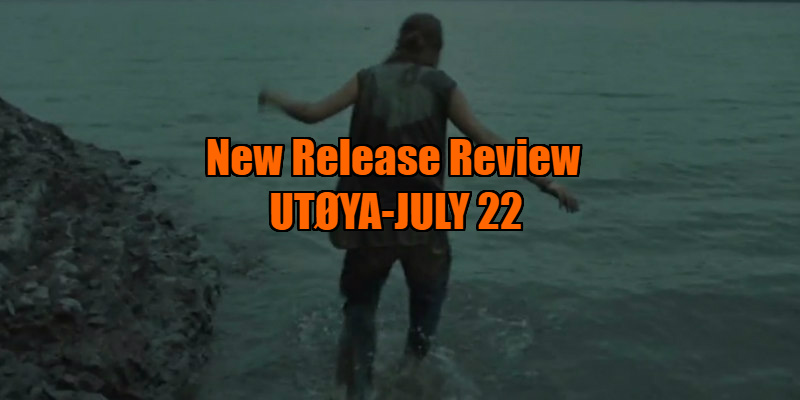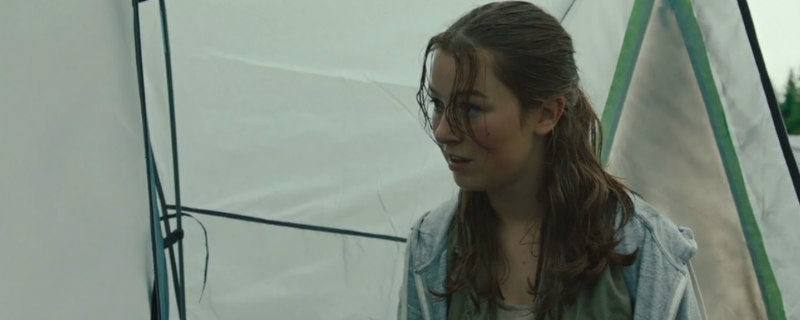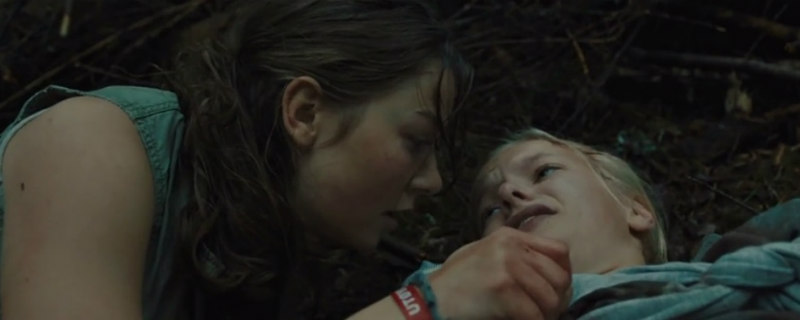
Review by Eric Hillis
Directed by: Erik Poppe
Starring: Andrea Berntzen, Aleksander Holmen, Solveig Koløen Birkeland, Brede Fristad

Norwegian director Erik Poppe's previous film, 2016's The King's Choice, dramatised his country's darkest moment of the 20th century, the Nazi invasion of 1940. For his latest work, Poppe turns his lens on the relatively peaceful Scandinavian country's greatest tragedy since WWII, the massacre of teenage attendees at a summer camp on Utøya island on July 22nd, 2011, by lone gunman Anders Breivik.
Along with director Paul Greengrass's Netflix produced 22 July, Utøya-July 22 is one of two movies released in October portraying the atrocity, but both adopt radically different approaches. Where Greengrass was more concerned with the fallout of the event in the months following, Poppe focusses solely on the massacre itself, his film playing out in real time through what is constructed to appear as one unbroken take.

Utøya-July 22 employs a fictional heroine, teenager Kaja (an outstanding turn from Andrea Berntzen in her first ever screen role), as our guide through the ordeal. She's introduced speaking to her parents on the phone in the aftermath of the explosion caused in Oslo's government district by a bomb planted earlier by Breivik, and there's an ominous cloud hanging over Kaja and her friends as they express relief at learning their families haven't been affected. "We couldn't be anywhere safer than on an island," one teenager states.
As is common in the immediate aftermath of terrorist attacks, a debate breaks out among the gathered youths as to who might be responsible and what their motivations might be. The debate is broken up by gunshots and hordes of screaming teenagers fleeing for their lives. When it becomes apparent that this tranquil Nordic isle is set to become the most dangerous place in the world for the next 70 minutes or so, Kaja attempts to locate her younger sister, from whom she was earlier separated.

Can a movie be both harrowing and healing? Is there any value to depicting tragic events on screen? Those are questions I asked myself prior to watching both 22 July and Utøya-July 22. In the case of the former I came away feeling Greengrass's film was not only pointless, but somewhat misguided. His film highlights the tolerant reaction of the Norwegian authorities in handling Breivik, allowing him a platform for his beliefs in court, and it suggests that by debating his views, Norway somehow beat him, yet the fact that Norwegian politics have shifted considerably to the right in the years since suggests otherwise.
Poppe isn't interested in patting his once liberal society on the back, and there's nothing to celebrate at the end of the film save for the bravery of its heroine. Breivik's name is never mentioned and we never see his face, glimpsing the bastard only occassionally from a distance or as an ambiguous shadow passing by a tent. It's a move I have to applaud, and one I wish the Norwegian authorities had adopted. Should we debate those who hold extreme views? Of course, but personally I believe that once you act on those views through violence you've lost your right to a platform. Murder is murder, and politics become irrelevant once you pull a trigger.
By disregarding Breivik's political motivations, Utøya-July 22 boils down the event to its basic essence, the senseless killing of dozens of defenceless young people. With the action playing out in real time, Poppe's film hammers home what a disastrous job the emergency services did in taking so long to reach the island. "Where are the police?" is a refrain heard throughout the film, and when the cavalry finally arrives you're all too aware of how much time has elapsed - enough time to watch an entire feature film.

Where 22 July depicted the massacre briefly, with faceless victims collapsing under gunfire in the background, Utøya-July 22 forces us to endure the atrocity from the eye of the storm. There's something distasteful in the agency Greengrass denies to his victims, but in Poppe's film we never see anyone die that we haven't gotten to know. There are no faceless victims here; in fact, you may find your dreams haunted by a couple of faces after viewing.
Utøya-July 22 isn't an easy watch, but I believe it's an essential one. 77 people lost their lives that day, and with such large numbers it can be difficult to grasp the true horror experienced by individual victims. In one truly harrowing and heart-breaking sequence, Kaja lies with a young girl who is slowly succumbing to a gunshot wound. Unable to form complete sentences, the girl mutters a few words, "Erik," "Airport," "Mummy", a reminder that this is a life that we're watching being erased. This is how death should be portrayed; it should make us uncomfortable and sad and in this case, angry, so, so angry. Watching a young girl's life fade away as her phone vibrates on her chest, the caller ID reading "Mummy," we're left in no doubt that the person responsible isn't deserving of debate.

Utøya-July 22 is in UK/ROI cinemas October 26th.

